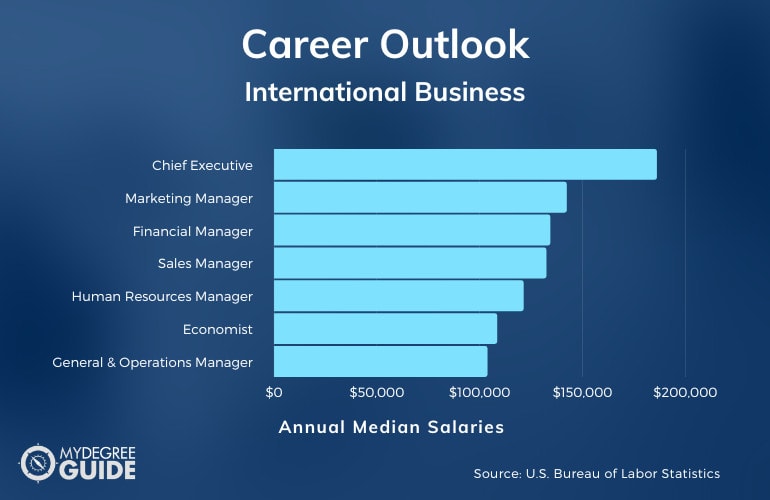A master’s in international business online can be the first step towards a lucrative career in an ever-expanding global economy.

Editorial Listing ShortCode:
Since it’s online, it can fit into your busy schedule much more easily than a campus-based program, and since it’s a specialized degree, it can teach you the skills that you’ll need to succeed within high-level roles and careers.
Universities Offering Online Master’s in International Business Degree Programs
Methodology: The following school list is in alphabetical order. To be included, a college or university must be regionally accredited and offer degree programs online or in a hybrid format.
1. Arizona State university
Founded in 1885, Arizona State University is a public research university with a main campus in Tempe. The university’s highly regarded faculty has included four Nobel laureates and six Pulitzer Prize winners. More than 100,000 students enroll at ASU each year to pursue bachelor’s, master’s, and doctoral degrees.
More than 150 undergraduate and graduate degree programs can be pursued fully online by ASU students.
Arizona State University is accredited by The Higher Learning Commission.
2. Concordia University – Wisconsin
Concordia University Wisconsin is a private Lutheran university located in Mequon, Wisconsin. Founded in 1881, the school enrolls more than 7,700 annually across more than 100 bachelor’s, master’s, and doctoral programs. In addition, options for accelerated e-learning are available for virtual students. Average class size at CUW is 18 students.
Concordia University Wisconsin is regionally accredited by The Higher Learning Commission.
3. Dallas Baptist University
Dallas Baptist University in Dallas, Texas, is a Christian liberal arts university dating back to 1898. DBU’s nearly 4,500 enrolled students pursue 78 bachelor’s programs, 32 master’s programs, and two doctoral programs. DBU notably offers 70 dual master’s programs.
Dallas Baptist University is accredited by the Commission on Colleges of the Southern Association of Colleges and Schools.
4. Florida International University
Florida International University is a public research university belonging to the State University System of Florida. Founded in 1965, FIU stands today as a public research university in Miami’s University Park offering students more than 190 areas of study spread across 11 colleges.
Bachelor’s, master’s, and doctoral degree paths are offered to nearly 59,000 students annually.
Florida International University is accredited by the Commission on Colleges of the Southern Association of Colleges and Schools.
5. Gardner-Webb University
Gardner–Webb University is a Christian university located in Boiling Springs, North Carolina, with an annual enrollment reaching 3,600. GWU offers more than 80 areas of spread across six professional schools for students pursuing bachelor’s, master’s, and doctoral degrees.
GWU is an NCAA Division I school that participates in the Big South Conference. The school was founded in 1905.
Gardner-Webb University is accredited by the Southern Association of Colleges and Schools Commission on Colleges.
6. Liberty University
Founded in 1971, Liberty University current enrolls nearly 80,000 students across its 550 bachelor’s, master’s, and doctoral programs each year. The bulk of Liberty’s students pursue degrees fully online through more than 280 online programs.
Liberty consistently ranks near the top of the list in terms of annual enrollment among colleges and universities in the United States.
Liberty University is accredited by the Southern Association of Colleges and Schools Commission on Colleges.
7. Lynn University
Founded in 1962, Lynn University is a private university in Boca Raton, Florida. The more than 3,000 students enrolled annually at Lynn University pursue bachelor’s, master’s, and doctoral degrees offered across six colleges. Lynn earned a spot in history when it hosted the final 2012 U.S. presidential debate between Barack Obama and Mitt Romney.
Lynn University is accredited by the Southern Association of Colleges and Schools Commission on Colleges.
8. National University
National University is a private institution based La Jolla, California, that empathizes flexible and virtual learning options for adult learners. Founded in 1971, NU enrolls nearly 24,000 students annually.
NU students can pursue bachelor’s, master’s, and doctoral programs across seven schools. National University is the flagship institution of the National University System.
National University is accredited by the Western Association of Schools and Colleges.
9. Oklahoma Christian University
Oklahoma Christian University is a private Christian university in Oklahoma City, Oklahoma, that was founded in 1950 in affiliation with the Churches of Christ. More than 2,500 students enroll at OC each year to pursue bachelor’s and master’s degrees. More than 80 percent of Oklahoma Christian University’s classes have fewer than 30 students.
Oklahoma Christian University is accredited by the Higher Learning Commission.
10. SUNY Empire State College
Part of the State University of New York (SUNY) system, Empire State College is a public college in Saratoga Springs with an annual enrollment topping 10,000.
A variety of bachelor’s and master’s degrees are available through the school’s flexible, innovative learning paths designed for traditional, independent, and virtual learning. SUNY Empire was founded in 1971.
SUNY Empire State College is accredited by the Middle States Commission on Higher Education.
11. Temple University
Temple University in Philadelphia, Pennsylvania was founded in 1907. The school offers more than 500 bachelor’s, master’s, and doctoral degrees across several schools and colleges. U.S. News & World Report ranked Temple in 44th place among all public universities in the country. Enrollment at Temple is just under 40,000 students.
Temple University is accredited by the Middle States Commission on Higher Education.
12. Tiffin University
Tiffin University is a private university in Tiffin, Ohio, dating back to 1888. Bachelor’s, master’s, and doctoral programs are offered through on-campus and virtual learning options. Tiffin enrolls more than 4,200 students annually. Tiffin operates a satellite campus at the University of Bucharest in Romania.
Tiffin University is accredited by the Higher Learning Commission.
13. University of Florida
Founded in 1853, the University of Florida is a senior member of the State University System of Florida offering bachelor’s, master’s, and doctoral degrees.
This land-grant, sea-grant, and space-grant university has been ranked in 7th place among the best public universities in the United States by U.S. News & World Report. Annual enrollment at UF tops 56,000.
The University of Florida is accredited by the Southern Association of Colleges and Schools Commission on Colleges.
14. University of Nebraska – Lincoln
The oldest and largest university in the University of Nebraska system, the University of Nebraska–Lincoln enrolls more than 25,000 students annually. Roughly 300 degree options offered through eight colleges are available throughout the university’s bachelor’s, master’s, and doctoral programs.
The university’s campus houses the University of Nebraska State Museum, the Sheldon Memorial Art Gallery and Sculpture Garden, and the Great Plains Art Museum.
The University of Nebraska-Lincoln is accredited by the Higher Learning Commission.
15. University of North Dakota
The University of North Dakota is a public research university in Grand Forks, North Dakota. Founded in 1883, the school now enrolls more than 13,000 students annually. UND students have options to pursue more than 24 fields of study spread across 90 bachelor’s majors, 54 master’s majors, and 27 doctoral majors.
The University of North Dakota is regionally accredited by the Higher Learning Commission of the North Central Association of Colleges and Schools.
16. University of Scranton
The University of Scranton in Pennsylvania is a private Jesuit university founded in 1888. Currently, more than 5,400 students enroll to pursue more than 100 study paths for bachelor’s, master’s, and doctoral degrees.
The University of Scranton has been ranked consistently among the top 10 schools in U.S. News & World Report’s school rankings of the Best Regional Universities North.
The University of Scranton is accredited by The Middle States Commission on Higher Education.
17. University of Wisconsin – Whitewater
A member of the University of Wisconsin System, the University of Wisconsin–Whitewater enrolls more than 12,000 students annually. UW–Whitewater is known for its robust honors, research, and apprenticeship programs. More than 70 programs are offered for bachelor’s, master’s, and doctoral studies at UW–Whitewater. The school was founded in 1868.
UW-Whitewater is accredited by the Higher Learning Commission.
18. Washington State University
Washington State University is a public research university in Pullman, Washington, that was founded in 1890. Annual enrollment at Washington State tops 30,000. The school is listed among the R1: Doctoral Universities for very high research activity.
Bachelor’s, master’s, and doctoral degrees in more than 200 fields are offered through 65 departments, schools, and programs.
WSU is accredited by the Northwest Commission on Colleges and Universities.
19. Webber International University
Founded in 1927, Webber International University is a private institution located in Babson Park, Florida. With an annual enrollment of just 800, Webber International offers a very personalized and focused learning experience for students. Associate’s, bachelor’s, and master’s degrees can be pursued at Webber.
Webber International University is accredited by the Southern Association of Colleges and Schools Commission on Colleges.
20. Webster University
Webster University is a private university with a main campus in Webster Groves, Missouri. The school was founded in 1915 by the Sisters of Loretto. Bachelor’s, master’s, and doctoral degrees are pursued by nearly 10,000 enrolled students annually. U.S. News & World Report has ranked Weber 17th among regional universities in the Midwest.
Webster University is accredited by The Higher Learning Commission.
Masters in International Business Online

Business degree programs online come in many varieties, but if you’re looking to excel both domestically and internationally, you’ll need one with a global perspective.
International business degrees are aimed at students who plan to work with overseas products, companies, or governments and aim to have a more global business perspective and hone their international relations skills. They cover the usual subjects like finance and economics, but they also have classes in things like communication, supply chain management, cultural studies, international trade, and world politics. Some even include the option of learning a foreign languages.
Whether it’s traveling abroad or simply working from home with cross-cultural partners, your work in international business can have unique challenges that are best served with a tailor-made degree for business leaders.
The good news is that international business programs can lead to several types of graduate degrees, so you’ll have options.
Here are just a few potential paths to a graduate-level degree with an international business concentration:
- Master of Science (MS) in International Business
- Master of Business Administration (MBA) in International Business
- Master in International Management (MIM)
You might also find graduate degrees with names like “Global MBA.” Regardless of the title that you pursue, a master’s degree in international business can prepare you for the unique challenges of the global market by expanding your specialized international business knowledge.
Business Careers & Salaries

According to the Bureau of Labor Statistics, salaries can and do top $100,000 per year for high-level positions within the international business specialization. Managers, directors, and senior executives are the top earners.
Common careers for international business students include:
| Careers | Annual Median Salary |
| Chief Executive | $185,950 |
| Marketing Manager | $142,170 |
| Financial Manager | $134,180 |
| Sales Manager | $132,290 |
| Human Resources Manager | $121,220 |
| Economist | $108,350 |
| General and Operations Manager | $103,650 |
| Transportation, Storage, and Distribution Manager | $96,390 |
| Management Analyst | $87,660 |
| Compliance Officer | $71,100 |
If you reach the upper echelons of a company, you could make as much as $208,000 per year as the CEO or CFO.
Choosing a Master’s in International Business Online Program

Which international business program is right for you? Ultimately, while you’re the only person who can answer that question, there are a few general assessments that you can make to determine the quality of either an on-campus or online MBA program.
- Reputation. Is it accredited? Does it have a good ranking with college networks? How does the international business program compare to the school’s other programs?
- Online program quality. Not all online programs are created equal. Some are more flexible than others, or they’re more affordable, or they offer better technological resources for students. You should also check to see if their online international business degree program is fully online or if it’s actually a hybrid online/offline program with certain face-to-face requirements.
- Admissions. Some business schools are easier to get into than others, so be sure to take a look at deadlines, transfer policies, eligibility requirements and overall acceptance rates.
- Opportunities. Does the program offer internships, networking groups or other ways to get ahead in the industry? Does it have international campuses for studying abroad?
There are other things that you should consider as well when choosing a business school, including tuition, credit requirements and faculty-to-student ratio. All in all, an international business administration program isn’t something to choose lightly.
International Business Curriculum & Courses

The curriculum of your MBA or MIM will depend on what you’re studying. For example, if your focus is on international marketing, your course load is going to look different than someone who’s concentrating on international finance or economics.
Speaking very generally, however, here are some of the subjects that are found in global business programs:
- Fundamentals of International Business: This is a basic, entry-level course designed to introduce the general framework of business relations with a global perspective. You might be allowed to waive it if you’ve already taken similar classes in your undergraduate business degree program.
- World Regions: These classes can offer in-depth looks at the major powers of the world and their trades, finances, business relationships, international trade capacity, international relations and cultural customs.
- Cultural Aspects of International Business: These courses can have many names, but they’re all devoted to fostering smart, sensitive communication between countries and cultures.
- International Finance and Banking: Finance can get tricky when you introduce different currencies, exchange rates and purchasing parities. These classes can give you the tools for handling them.
- Organizational Behavior: This area of study isn’t related to specialized international business knowledge, but it’s frequently required as a core credit in MBAs and MIMs in general.
- World Politics: Even if you aren’t planning to pursue a government-related career, it can be helpful to have a familiarity with global politics as you enter the global workforce.
- Global Marketing Concepts and Strategies: These courses can teach you how to navigate the customs and cultures of foreign nations in a way that maximizes your sales and minimizes your chances of a faux pas.
- International Business Law: These classes cover topics such as contracts and licensing agreements as well as global business ethics that may crop up during global business dealings.
- Management Practices: If you’re aiming for a high-level job with your master’s degree, you might benefit from classes in leadership, communication, global supply chain management, team development and strategic decision-making.
- Foreign Languages: Foreign languages can be helpful for students who plan to work abroad. They’re usually electives, but some of the top international business schools might require or encourage them more strongly than others.
If you’re enrolling in an online program, make sure to ask the school about potential face-to-face requirements such as practicums or internships. You might also want to inquire about your eligibility for studying abroad in order to get first-hand experience in today’s international business environment.
Some international business programs partner with sister cities around the globe to let students gain real-world experience in foreign settings, which should give you a more global business perspective.
Admissions Requirements

As a graduate, you’ve already been through the rodeo of the college admissions process, and you’ll find that much of it is the same for your master’s degree.
There are just a few tweaks here and there.
- Transcripts. Instead of your high school transcripts, you’ll need your previous college transcripts, often showing that you have earned a bachelor’s degree from an accredited school.
- Test scores. Instead of SAT/ACT scores, you’ll need Graduate Record Examination (GRE) or Graduate Management Admission Test (GMAT) scores.
- Resume or CV. These things can be incredibly relevant to a master’s program if you have any professional experience in the industry or have published any research.
- Statement of purpose. As an upgraded version of the usual college essay, this is where you can personalize your application.
Before you apply anywhere, it’s important to remember that every business school is different, and they’ll have different standards and expectations for incoming graduate students. For example, some colleges have adopted a “test optional” philosophy where things like the GRE/GMAT aren’t required. You will usually need to have earned a bachelor’s degree before being admitted into a graduate degree program.
On the flip side, some of the top international business schools have admissions equations where GRE/GMAT scores are important numbers that get calculated in an applicant’s final score.
Accreditation

Colleges go through the accreditation process to prove that they’ve met the educational standards set forth by the U.S. Department of Education and organizations like the Council for Higher Education Accreditation (CHEA).
There are three types of accreditation:
- Regional accreditation
- National accreditation
- Programmatic accreditation
The most common is regional accreditation. This is what you’ll see from the majority of public and private universities, including the Ivy Leagues. It divides the U.S. into several different regions with their own individual accrediting boards.
If you’re unsure about the accreditation status of your chosen college, check the CHEA website. They have a search engine for their database, so you can pull up information with just a name and/or location.
International Business Professional Organizations

Industry organizations can be a great resource for both students and working professionals. Not only can they offer access to things like scholarships, conferences and certification programs, but they can also put you in touch with others in your field for networking opportunities in today’s international business environment.
Here are just a few organizations that might interest you as an international business student:
- Academy of International Business (AIB)
- American Management Association
- Association of MBAs
- International Academy of Business Disciplines (IABD)
- International Academy of Business and Economics (IABE)
Before you apply for membership, check and see if they offer discounted rates for students or groups. You might find a group of classmates who are also interested in joining.
Keep in mind that these organizations are not only students with an international business degree, but any other business related degree as well. So even if you just have an associate’s in business administration, for example, it could still be worthwhile connecting with any one of these organizations for business leaders.
Financial Aid & Scholarships

As a graduate student, your financial aid opportunities will be slightly more limited than they were as an undergrad, but you may still be eligible for multiple types of assistance.
- Grants. You won’t qualify for things like the Federal Pell Grant anymore, but you can still apply for other state- and school-funded grant programs.
- Loans. FAFSA has a special loan just for post-baccalaureate students: the Direct PLUS Loan for Graduate or Professional Students.
- Scholarships. There are many, many scholarships for students enrolled in business programs. Some are even meant specifically for master’s degree students.
- Tuition reimbursement. Some companies have programs to help their employees pay for school, especially when they’re studying relevant topics to their industry.
If you’re wondering if it’s still worth it to fill out the Free Application for Federal Student Aid (FAFSA), the answer is yes.
It will automatically determine any types of assistance that you’re eligible for, and since it won’t cost you a dime, you have nothing to lose by submitting your information.
How Long Does it Take to Get a Masters in International Business Online?

It can take anywhere from 1 – 3 years to earn a master’s degree in the international business specialization. Programs typically require between 40 – 60 credits. This is very reasonable especially when compared getting an online PhD in international business which may take roughly between 4 – 8 years.
If you’re a full-time student, you can graduate faster than someone attending part-time, especially if you sign up for summer semesters. Other ways to accelerate your schedule include online or dual degree programs.
Is a Master’s in International Business Worth It?

Yes, a master’s in international business is worth it for many students. According to the U.S. Bureau of Labor Statistics, business occupations are projected to grow by five percent within the next decade, and that translates to almost 500,000 new jobs. Common careers in the field include compliance officer, management analyst, economist, financial manager, and marketing manager.
It can be quite lucrative to earn an MBA in international business. They even cite globalization as a cause, so you’ll be earning an advanced degree in a specialized, high-demand field where your skills are needed.
How Much Does an Online Masters in Global Business Cost?

The price of your master’s degree will depend on your university. Like bachelor’s degrees, they’re charged on a per-credit basis, so your tuition rate can be calculated like this:
- Cost per credit x credits required for graduation = tuition price
The U.S. News and World Report determined that the most affordable MBA programs charge between $300 – $400 per credit, but they also noted that some programs can charge more than $2,000 per credit. It really does depend on your school.
What Can You Do With an International Business Degree?

An international business degree can take you down many different roads. Depending on your interests, you could work in finance, policy, retail, technology, politics and more. Here are a few potential careers with an international business concentration:
- International marketing manager
- Foreign office liaison
- Business development director
- Translator/interpreter
- Management consultant
As the world expands with global marketplaces, there’s an increasing need for professionals in all industries who are able to meet its unique challenges. You can apply an international business degree to a wide variety of jobs and industries.
Are There Any Affordable Masters Programs in International Business Online?
There are many ways to get through an online MBA program in international business without breaking the bank. You can look for an affordable business school, for example, that doesn’t charge as much in tuition as its competitors. You can seek out various forms of financial aid.
You can also look for degree programs that offer financial incentives for students who enroll online versus on campus. Tuition might be banded, or per-credits rates might be the same for online students regardless of in-state or out-of-state residency. These things can save you a lot of money in the long run.
What’s the Difference Between a Master of Science vs. MBA in International Business?

While there’s a lot of overlap between an MA, an MBA and even an MIM, there’s one key difference between them.
A master’s degree in international business is a highly specialized degree that only concentrates on the subject at hand. Everything that you learn will be focused on and applicable to international business.
By contrast, a master’s in business administration is a broad, wide-ranging degree that can be applied to many different fields, and international business might only be a small area of study in its larger curriculum.
Both graduate degrees have their pros and cons, so it’ll be up to you to decide which is right for your career ambitions.
Getting Your Master’s in International Business Online

A master’s degree in international business can help you take your career to the next level. Not only can it teach you valuable, real-world skills to prepare you for the challenges and complexities of the global marketplace, but it can also offer a high return rate for your educational investment.
Salaries regularly reach six figures or more, and demand is growing at a faster rate than many other occupations.
Are you looking for a promotion? Do you want to change careers? Consider an international business degree. Especially when you’re learning online, it can be a dynamic choice with a lot of flexibility to lead you to a brighter future.
